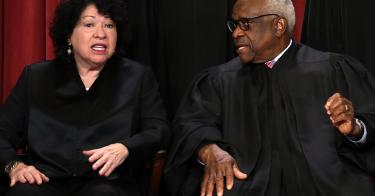Equality under the law is a bedrock principle of our country.
But sadly, it’s fallen out of fashion, with many calling for “equity”—the favoring of certain racial or ethnic groups—instead of equality.
This toxic ideology has infused our culture and our courts in many ways, both large and small.
Once neutral areas like procedural and grammatical rules are being weaponized to subtly (or maybe not so subtly) advance the radical equity-over-equality agenda.
To this end, it has become fashionable for writers in both popular culture and the courts to treat and write about people differently based on their race. Many likely don’t even realize they’re doing it and probably (albeit mistakenly) believe they are being good grammarians and following the proper rules.
But they’re not. To explain why, it’s important to back up and put this debate in its proper context.
All of this came about in the wake of the racial unrest and riots in the summer of 2020. Certain news outlets, including The Associated Press and The New York Times, “updated” their style guides so that the word “Black” would be capitalized as a racial identifier, but other racial identifiers such as “white” or “brown” would not.
The AP said that its style is now “to capitalize Black in a racial, ethnic or cultural sense,” because doing so conveys “an essential and shared sense of history, identity and community among people who identify as Black.”
But the 177-year-old wire service said that AP style “will continue to lowercase the term white in racial, ethnic and cultural senses.”
To justify its decision, the AP said that “[w]hite people generally do not share the same history and culture, or the experience of being discriminated against because of skin color.”
The New York Times echoed similar sentiments in justifying its decision to capitalize the word in this context. So did The Washington Post.
But consider the racist and reductionist mindset implicit in these assumptions: All black people share essentially the same history, identity, and community based on nothing more than the color of their skin. That’s textbook racial stereotyping.
And while these developments are troubling no matter where they occur, they are particularly troubling when they occur in the courts.
How can courts mete out “equal justice under the law” when they themselves are treating people differently based on their race?
Although some litigants, lawyers, and judges have chosen to act discriminatorily and follow the lead of the AP, the Post, and the Times, others—thankfully—have not.
Compare U.S. Supreme Court Justice Sonia Sotomayor, for example, with Alabama Supreme Court Justice Jay Mitchell.
Sotomayor suddenly began capitalizing “Black” in 2021. As some have noted, until April of that year, “her opinions uniformly put the term in lowercase.”
Mitchell, on the other hand, took the courageous and correct step of calling attention to the practice and castigating it, saying that such a practice “has no place in our legal system.”
Some justices on other courts, such as the Florida Supreme Court, have taken steps to ensure that racial discrimination has no place in our legal system. Others sadly have not, pledging instead to take actions such as giving preferential hiring to those of certain races or granting oral arguments only if litigants are represented by lawyers of a certain sex or race.
At the end of the day, some might ask why all the fuss about capitalizing or not capitalizing certain words.
But as the lion of the legal lexicon, Bryan Garner, put it: “Are these questions of nomenclature trivialities? Decidedly not. It’s not trivial what you call a person or a whole group of people—especially a group that the law considers a protected class.”
And more than that, it’s an issue of fundamental fairness. If we, as a society, truly believe that everyone should be treated equally, that should apply to all matters.
We shouldn’t let language—particularly our legal language—be weaponized to support a radical ideology based on discrimination.
This piece originally appeared in The Daily Signal




